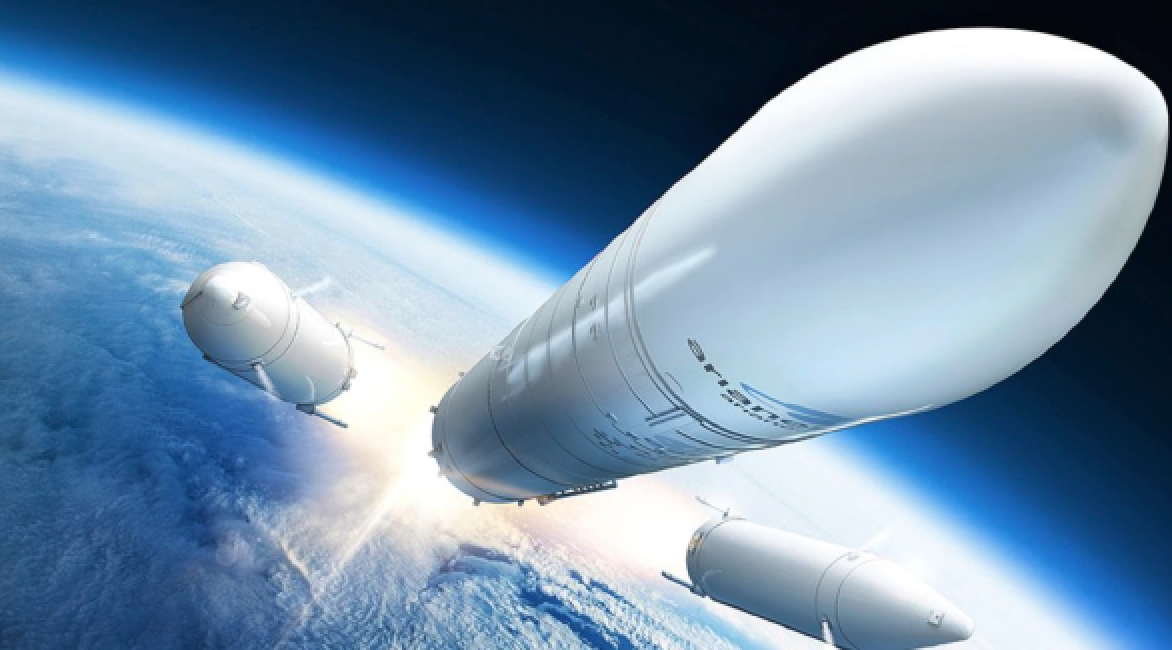The already much-delayed debut launch of Ariane 6 rocket is to be further delayed. A September 4 briefing by the European Space Agency (ESA) announced that maiden flight is not now likely until the middle of 2024. The delays are likely to push the rocket’s first commercial launch toward the end of 2024.
The original schedule called for the maiden flight for Ariane 6 to occur in 2020. These latest delays, described by one observer as “calamitous,” follow on from a series of seemingly never-ending postponements for the rocket.

Artistic rendition of the Ariane 6 rocket in flight is courtesy of Arianespace.
The September 4 briefing was deliberately mounted because of growing criticism of ESA and the rocket’s contracting partners. One highly public comment in August described the secrecy and lack of transparency that surrounded the project and alleged that ESA had been guilty of deliberately misrepresenting progress in the rocket’s development.
The September 4 briefing was designed to counter this criticism; however, the briefing only confirmed what many experts had already suspected — that the rocket was a long way off from being ready for launch.
On September 5, a test burn of the giant Vulcain engine was again scheduled to take place as the engine had suffered incomplete tests in July and August. It was these July and August tests that the allegations of disinformation were concentrated.
The critical comments and the facts make disappointing reading. For example, June 22 should have seen delay, and now to 2024.
the beginning of a thorough test of the new rocket’s massive Vulcain 2.1 engines. A June 25 press release from ESA stated that the tests were “progressing well” and added “Representatives of ESA, Ariane 6 prime contractor ArianeGroup and launch base prime contractor and test conductor [French Space Agency] CNES completed important objectives for system qualification and performed a series of actions fully representative of a launch chronology.”
This statement was — at best — a classic press fudge of the facts. The truth was that the launch team could not complete a count-down and achieve its 4 second engine test and the issued information was deliberately vague.
ESA on June 25 added that many aspects were tested (“Operational procedures, lower and upper stages, avionics, software, launch base, and control bench worked correctly together, and the performance of the full launch system was measured with excellent results.”) All this was undoubtedly true, and were valuable elements of the overall process. However, there was no mention of the missing engine test.
ESA Director General Josef Aschbacher is on record as promising greater transparency for the publicly-funded operation, and the September 4 briefing was an attempt to counter criticism. He told the briefing that this September 5 test and further test-firings of the rocket’s engine should then allow the agency to set a target for the first launch. “We will then be in a position to define a launch period for Ariane 6, which we will announce to you after these series of tests have been conducted.”
Nevertheless, there was again a degree of fudge at the September 4 briefing when CNES President Philippe Baptiste said that the July 18 test was a nonstop 26 hour sequence to imitate a launch campaign.
“The moving of the gantry, the liquid systems, the software — everything worked perfectly,” said Baptiste, although skirting over the non-firing of the rocket’s engine. He added that the September 5 test was scheduled to run the Vulcain engine at full power for four seconds, and testing acoustic and air flows to ensure that they match what’s expected.
The panel of experts at the briefing added that there would likely be a 6-month delay following the debut test flight before a commercial launch could take place.
The Ariane facts are that a promised Maiden Flight for Ariane 6
in 2020 has been totally missed. That date slipped to a
re-promise for 2021. That was missed. By June 2021, the date
had delayed to late 2022. In June 2022 a delay was announced
to “some time in 2023”. By October 2022, ESA clarified that the
first launch would be “no earlier” than Q4 of 2023, while
providing no public reason for the delay, and now to 2024.
Aschbacher added, “We are on a good track. We have stabilized the schedule. The tests are looking really good. I think the chances, if everything goes perfect, are pretty good that it’s not too late in the next year, but there are still a lot of unknowns ahead of us.”
But the delays are a huge embarrassment for ESA and its construction partners. The further delays also mean higher costs for the production teams. An initial €4 billion budget ($4.3 billion) is still “contained” said Toni Tolker-Nielsen,
ESA’s director of space transportation, and has not yet been exceeded, but ArianeGroup admitted that there have been “very significant costs” to be incurred because of the delays.
The postponements of the debut flight and its first commercial launch could also impact orders for the rocket, and these include a major 18launch order from Amazon’s Jeff Bezos for carrying his Project Kuiper broadband satellites into orbit.
ArianeGroup Chief Executive Martin Sion said during the briefing that there were 15 Ariane 6 vehicles already in production. Sion told the briefing that Arianespace had 28 firm orders for the rocket and that its contractors could produce 9 to 10 vehicles per year.
The order book for Ariane 6 contains governmental and science projects, as well as the Project Kuiper demands. Not helping the Bezos/Amazon project are delays to Blue Origin’s own New Glenn rocket. Kuiper is on a strict deadline. The FCC requires half of the Kuiper 3236 constellation of satellites to be on-- obit during 2026. That clock is ticking!
The Amazon Kuiper Project is also facing shareholder grumbles and the New Glenn and Arianespace delays could add fuel to a lawsuit lodged by the Cleveland Bakers & Teamsters Pension Fund/CB&T against Amazon which alleges two counts of breaches of fiduciary duty against Amazon.
The suit argues that alleged personal animosity between Jeff Bezos and SpaceX’s Elon Musk meant that Amazon’s board of directors were not presented with SpaceX as an option for the Kuiper launch contracts. Arianespace, Blue Origin and the United Launch Alliance were the only options presented, says the writ.
CB&T alleges the Amazon audit committee received only “a brief summary of the terms of the contracts” and “rubberstamped” the launch deals “after only a few minutes of discussion.”
Amazon, in a statement on September 1, said, “the claims in this lawsuit are completely without merit, and we look forward to showing that through the legal process.”
At its May AGM, Amazon disclosed it expects to pay about $7.4 billion for Kuiper’s launch services through 2028, with $2.7 billion expected to go to Blue Origin, which is wholly owned and financed by Bezos.
The question remains as to whether Musk and SpaceX would have agreed any sort of order for launching Kuiper satellites which will be — when on-orbit — direct competitors to SpaceX’s Starlink craft.

Author Chris Forrester is a well-known broadcasting journalist, industry consultant and Senior Columnist for SatNews Publishers. He reports on all aspects of broadcasting with special emphasis on content, the business of television and emerging applications. He founded Rapid TV News and has edited Interspace and its successor Inside Satellite TV since 1996. He also files for Advanced-Television.
In November of 1998, Chris was appointed an Associate (professor) of the prestigious Adham Center for Television Journalism, part of the American University in Cairo (AUC), in recognition of his extensive coverage of the Arab media market.


